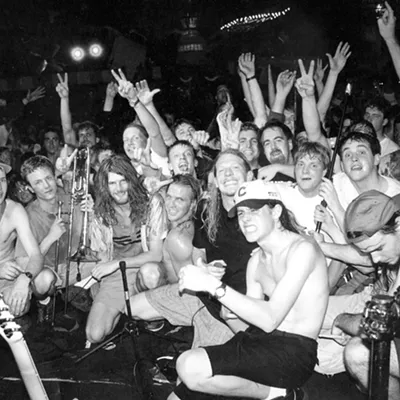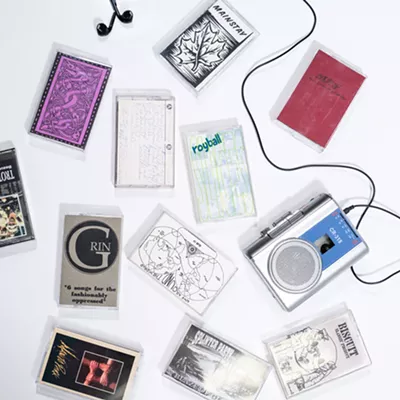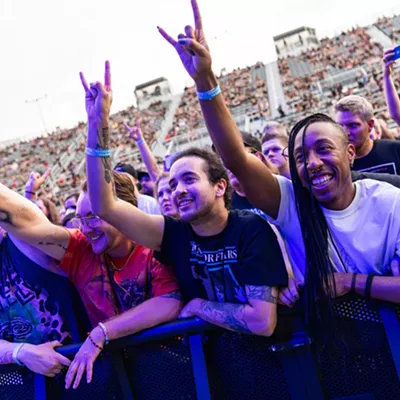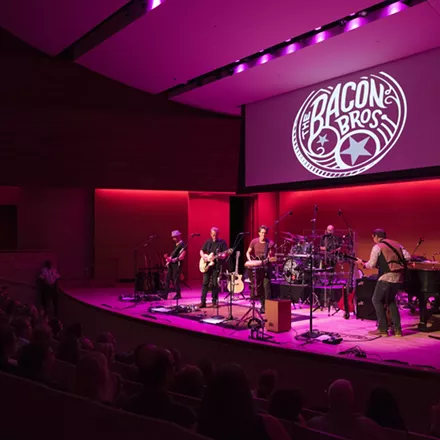Of all contemporary pop singers, none has cultivated a persona richer or mythology more enduring than Manchester, England's Steven Patrick Morrissey. With legendary U.K. band The Smiths (1982-86), and over the course of a lengthy solo career (1988-present), Morrissey has lyrically aligned himself with obsessive losers, gang members, stalkers, ugly and fat people -- always singing on behalf of characters with debilitating self-esteem issues. Hands-down, Morrissey is pop's champion of the self-conscious, unloved masses.
In his early days, Morrissey was known for carrying a handful of gladiolas in his back pocket, wearing loose, flowing blouses and dime-store women's jewelry. Now, he sashays around the stage in James Bond suits, acting out songs like bits of tragic radio theatre. Known for his golden voice, he sings poetry with a graceful, open-throated tenor, adding color with over-the-top faux-operatic flourishes. His audacious vocal and visual styles indicate an utter fop, while his lyrics reveal a near-suicidal self-loathing. Morrissey is constantly daring you to take him seriously. And that is your choice.
American audiences have a more difficult time with the serious/not-serious distinction than Brits. Of the Smiths' four albums, all went to at least No. 2 on the British pop charts but failed to crack the top 50 in this country. Americans, irrationally paranoid of being taken for fools, were confused by Morrissey, uncertain if he was "real" or "fake," marking him too cerebral a pop star for America to handle. He does, however, enjoy a strong cult following here, particularly among geeks who hang out at record stores.
As it pertains to college/indie rock, Morrissey's Smiths-era work is as influential as the Cure, the Pixies or R.E.M. The Smiths' songs are sugar-sweet pop with serious pathos, using the interplay between guitarist Johnny Marr's precise, jangly lines and Morrissey's sweeping victim poses to simultaneously literal and ironic effect. The Smiths are no more (Marr now records and tours with Modest Mouse), but its aesthetic continues in Morrissey's solo work. The backing tracks are deadly direct, even cloying at times, but always very catchy pop -- and for all Morrissey has done to pop's lyrical landscape, his melodies hit hard and hit first.
The Smiths' strummy sound was mostly organic, coming from amps, mics and guitars. Morrissey's recent work values glossy, stylized production -- it feels like really well-done plastic surgery. Both sounds, though, enforce Morrissey's famous paradox: Pop music is deep enough to confront the darkest parts of humanity, but you have to exploit its cheap thrills to really use it. A Morrissey song is heavy and angry, but it's also petty and silly.
He marches on, album after album, with better hair, more expensive suits, and a voice that just keeps getting better. Morrissey's ever-widening ability to channel the world's self-hate makes him pop's most vicarious figure, the world's most graceful vessel for human suffering, an icon of the human condition. He's like Jesus, dying for your sins on every album, only to rise again.
He sang the world's insecurities long before emo-rock made it cool to pseudo-psychoanalyze yourself and everyone around you. He broke down barriers concerning acceptable levels of pretension in pop and is a clear prototype for tons of bands that came after. His latest album, Ringleader Of The Tormentors, is one of his strongest.
Morrissey is the archetype of stylish depression, and having branded himself so, will never really die. Like Batman, he is a character, an idea and, come Saturday, he's here to save your life.
BANDS THAT OWE MORRISSEY BIG TIME
R.E.M. | The Athens, Georgia band's early jangle-pop is straight from the Morrissey/Marr songbook.
Pulp | Jarvis Cocker learned from Morrissey how to obsess, hate himself for obsessing, and use that loathing for comedic purposes.
Belle and Sebastian | Their album art owes a great deal to The Smith's iconic duotone singles sleeves. Also from Morrissey: depiction of sexuality as nonstop nervous confusion.
The Decemberists | Morrissey taught Colin Meloy that a fey, literary bent, taken to the max, is actually kind of bad-ass.
Bright Eyes | Especially on his earlier albums, Conor Oberst's self-hate is Morrissey unhinged.
Morrissey with Kristeen Young at the Big Easy on Saturday, May 5 at 8 pm. $55. Visit www.ticketswest.com or call 325-SEAT.





















